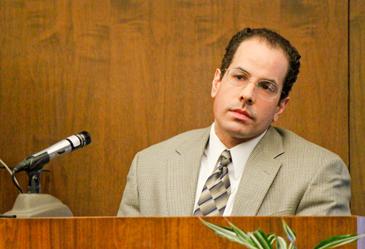By late Dec. 13, the jury in the Isaac Campbell trial had not yet returned a verdict.
The jury spent more than six hours Dec. 7 and the whole day Dec. 8 deliberating the fate of ex-PCC student Campbell, who is facing one count of murder in the death of his girlfriend, a PCC alumna.
Closing statements in his trial were presented Tuesday at the Alhambra Superior Court. The prosecuting team implied that Campbell was swift with the cover-up, therefore giving the impression that Lu’s killing was premeditated. The defense team argued that there’s a lack of evidence to support the prosecution case.
Campbell has spent four years in jail in the killing of Liya “Jessie” Lu. The long delayed trial ended Dec. 7, however, the jury had been given ample amounts of evidence from both sides, including phone recordings, martial arts training, and witness testimonies.
Deputy District Attorney Steve Ipsen presented phone records which diagrammed the time and setting of the killing as well as Campbell’s attempts to cover up the crime. According to Ipsen, Campbell was quick in killing Lu, arguing that there was no conversation that escalated into a dramatic scene, as Campbell testified.
“The last phone call was at 12:33 a.m. and she was dead by 1:29,” Ipsen said to the jury. “That goes to show you how fast he carried out his intent.”
Ipsen also said that Campbell was steadfast in checking Lu’s voicemail and text messages.
Public defender Jim Duffy, on the other hand, argued that the prosecuting team failed to prove anything beyond a reasonable doubt and relied solely on tiding the jury against Campbell.
According to Duffy, the investigation to gather evidence against Campbell was what delayed the trial. Apparently, police had gone to extensive lengths in order to seize information ranging from love letters, to videos, to even computers. By the end of it all, Duffy said that there was no evidence to prove that Campbell had intended to kill Lu to begin with.
“[Ipsen is] relying on your passion,” Duffy said. “It’s about innuendo, it’s about speculation, it’s about whispers in the wind.”
George Molina, a coworker of Lu, was waiting for her outside of Campbell’s apartment at the time of her death. He had been helping transport the television Campbell had promised her. Instead of taking her back to her apartment, however, Molina received a text from Lu who said she had decided to sleep over.
“That was Isaac Campbell telling him to get out,” Ipsen said. Ipsen also included voicemail recordings from Jeremy Zhou, a cousin of Lu. Campbell checked the voicemails after Lu’s death and texted Zhou back as if Lu were still alive.
Ipsen also presented evidence of a broken door at Campbell’s apartment throughout the trial. However, there was little connection to the murder because Campbell had testified that he had tried to break into his apartment after having locked himself out.
Ipsen explained that the damage to the door was evidence of anger.
“He wanted that door open and that door was locked,” Ipsen said. “Liya may have been on the other side, seeking refuge.”
According to Ipsen, Campbell was quick to begin covering his tracks. “He not only discarded Liya Lu and her belongings, but he made every effort to cover it up from the very beginning,” Ipsen said. “It shows the consciousness of his guilt. It shows he was thinking, ‘How can I cover this up?'”
Campbell had testified that after a heated argument with Lu, Campbell tried to hug her but was bitten. Campbell testified that he pushed her back into the futon and left to go to bed. When he realized that Lu didn’t continue the fight, Campbell returned to the living room and found Lu on the floor. Attempts to wake her up failed and Campbell refrained from calling 9-1-1.
“If the defendant didn’t do anything wrong, then all he had to do was call 9-1-1,” Ipsen said. “It’s pettily absurd that he was grieving for her when he didn’t do a doggone thing to help her.”
Duffy told the jury that prosecuting teams did not testify that when Zhou had called Lu the night she had died, he had heard a male arguing in the background.
“That’s not what the [prosecuting team] wants to release because it is heated passion,” Duffy said.
The verdict for Campbell hinges on whether or not the murder was premeditated.
According to Judge Laura Priver, a suspect is innocent of homicide if the defendant kills out of passion or kills by accident. In addition, Campbell may be excused or the charge may be dropped to voluntary manslaughter if he was provoked.
Duffy also said that the prosecuting team provided testimony surrounding Lu’s neurological health from an optometrist and a radiologist – two experts who are not specialized to offer such testimony.
The jury was given the option to charge Campbell with first degree murder, second degree murder, voluntary manslaughter, or involuntary manslaughter.

Isaac Campbell took the stand on Nov. 30 in his trial for a murder charge in Alhambra. (Louis C. Cheung / Courier)
- EDITORIAL: Apologize about the real problem - April 23, 2014
- STATEMENT: District apologizes to Oscar winning alum - April 21, 2014
- EDITORIAL: The Forgotten Students - March 26, 2014
